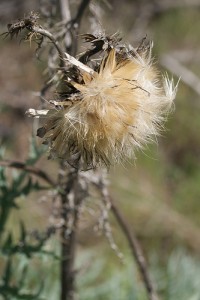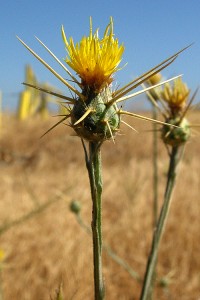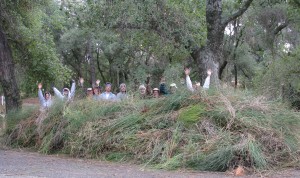 Invasive non-native organisms are one of the greatest threats to the natural ecosystems of the U.S. and are destroying America’s natural history and identity. These unwelcome plants, insects and other organisms are disrupting the ecology of natural ecosystems, displacing native plant and animal species, and degrading our nation’s unique and diverse biological resources. Aggressive invaders reduce the amount of light, water, nutrients and space available to native species, alter hydrological patterns, soil chemistry, moisture-holding capacity, and erodibility, and change fire regimes. Some exotics are capable of hybridizing with native plant relatives, resulting in unnatural changes to a plant’s genetic makeup; others have been found to harbor plant pathogens that can affect both native and non-native plants. Still others contain toxins that may be lethal to certain animals.
Invasive non-native organisms are one of the greatest threats to the natural ecosystems of the U.S. and are destroying America’s natural history and identity. These unwelcome plants, insects and other organisms are disrupting the ecology of natural ecosystems, displacing native plant and animal species, and degrading our nation’s unique and diverse biological resources. Aggressive invaders reduce the amount of light, water, nutrients and space available to native species, alter hydrological patterns, soil chemistry, moisture-holding capacity, and erodibility, and change fire regimes. Some exotics are capable of hybridizing with native plant relatives, resulting in unnatural changes to a plant’s genetic makeup; others have been found to harbor plant pathogens that can affect both native and non-native plants. Still others contain toxins that may be lethal to certain animals.
Put simply:
- Non-native plants reduce biodiversity, and reduce habitat available to native animals like birds and butterflies.
- Non-native plants alter natural landscapes, and increase the frequency and intensity of fires.
- Non-native plants contribute to species endangerment. 42% of the nation’s endangered and threatened species have declined as a result of encroaching exotic plants and animals. – U.S. Fish and Wildlife Service
- Non-native plants cost us money! Each year, the National Park Service and the Fish and Wildlife Service spend an estimated 2 and 10 million dollars, respectively, on controlling exotic plants (Westbrooks, 1998).
- Non-native plants also cause great economic losses and expenditures each year, measured in billions of dollars, for agriculture, forestry, range lands and roadways management (Westbrooks 1998).
Native insects, birds, mammals, reptiles, fish and other animals are dependent on native plants for food and shelter. While some animals have a varied diet and can feed on a wide number of plant species, others are highly specialized and may be restricted to feeding on several or a single plant species. For example, caterpillars of the monarch butterfly have evolved to feed primarily on plants in the genus Asclepias (milkweeds) that contain special chemicals. The term host plant is generally used to describe a plant species that is required food for at least one stage of an insect or other animal. As exotic plants replace our native flora, fewer host plants are available to provide the necessary nutrition for our native wildlife.
Approximately 4,000 species of exotic plants and 500 exotic animals have established free-living populations in the United States. Nearly seven hundred are known to cause severe harm to agriculture at a cost of billions of dollars annually. Over 1,000 exotic plant species have been identified as a threat to our native flora and fauna as a result of their aggressive, invasive characteristics. While Back to Natives discourages the use of ANY plants not native to your local area, some plants are more harmful than others. To see if you have an aggressive, invasive plant in your garden, visit http://www.cal-ipc.org/ip/inventory/weedlist.php
- Avoid disturbance to natural areas, including clearing of native vegetation and planting of non-native plants.
- Do not purchase or use invasive exotic species in your landscaping or erosion control projects.
- For landscaping, use plants that are native to your local region as much as possible.
- Control exotic invasive plants in your landscape by removing them entirely.
- Discuss your concerns about invasive exotic plants with nurseries and garden shops and ask them not to sell these species. Provide them with printed material (such as this) explaining the problem to read later. Ask for non-invading alternatives instead.
- Work with your local government to encourage the use of native plants in their urban and suburban landscapes.
- Notify land managers of invasive exotic plant occurrences.
- Offer to assist in exotic plant removal projects. Contact volunteer@backtonatives.org to volunteer!


